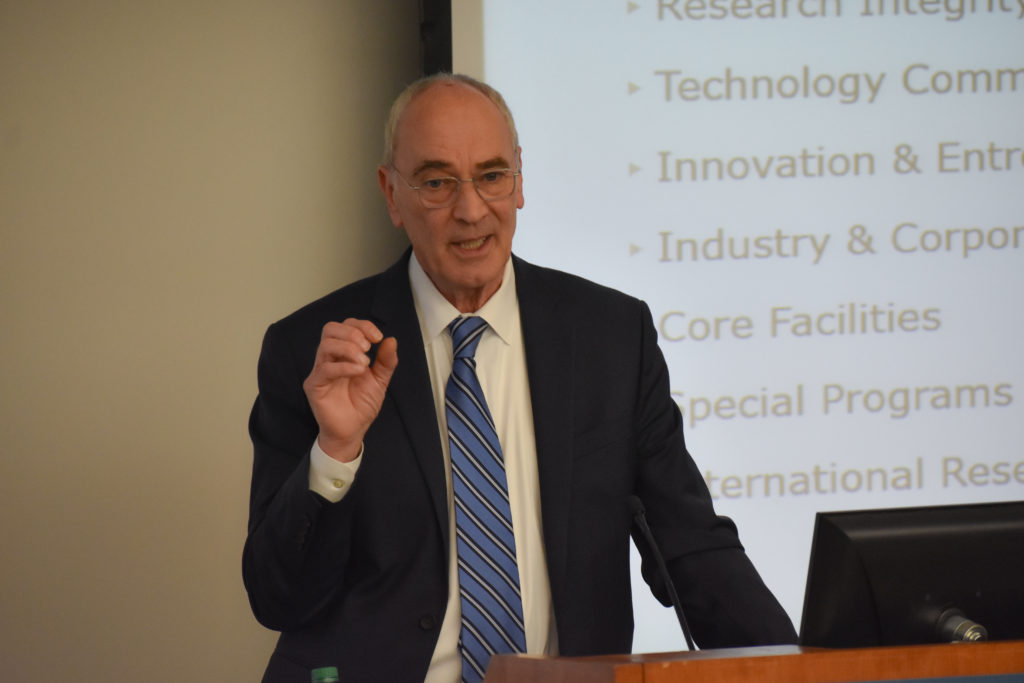The University has been working to fulfill recommendations laid out in the results of the first phase of a faculty-led research review released in April.
Officials said at a Faculty Senate meeting Friday that the University has upheld its commitment to provide institutional funding for research initiatives and has taken steps to boost undergraduate engagement in research since the ecosystem review launched last fall. Vice President for Research Robert Miller said he will continue to hire faculty with strong research backgrounds and initiate corporate partnerships that will provide researchers with greater revenue-building opportunities and exposure for their projects.
“The strategic planning is two things,” Miller said. “It’s one, thinking about what are our disciplines that we’re actually going to focus on and strive for preeminence, and then the other one is, ‘How are you actually going to implement that?’”
The ecosystem review is one aspect of the University’s multi-step strategic plan to bolster its research profile. In April, officials released Phase I of the review, which recommended that the University hire more postdoctoral fellows and improve communication between faculty, staff and students.
Miller said officials have extended funding for programs like humanities research that are not privy to as many external funding opportunities or grants as other programs.
“One of the things that the president promised when he came in was that we would maintain support from institutional money to drive scholarship and research in those areas that are not easily attributable for external funding,” he said.
Miller said the educational working group that conducted the review created the GW Student Research Commons this academic year, which allows undergraduates, graduate students and postdoctoral fellows to learn about research opportunities.
He said he plans to spearhead partnerships with corporations to build revenue for the school and expand the breadth of research faculty can conduct. Miller said corporate partnerships give researchers opportunities to share their discoveries with wider audiences than if they were conducting individual research.
“It’s a way of getting our ideas out into society, and I think that’s the most important,” he said in an interview.
Miller said entities that fund research efforts review research processes to ensure their money is spent the way they intended, and GW received a perfect score on the most recent review. He said the University should prioritize research integrity, or ensuring that research is completed in the way the research’s financier intended, moving forward from Phase I of the review.
Miller said reports from Phase II of the review are due to University President Thomas LeBlanc in February, at which point the review team will begin strategizing how to respond to the reports’ recommendations.
“We cannot afford to have lapses in any of these areas, you cannot afford to have federal dollars that are not going to the work that they do proposed to do,” Miller said.
Arthur Wilson, an associate professor of finance, asked Miller how he plans to bolster research in the School of Business, which was not included in the report.
“I’m from the School of Business, so I guess I’m a little bit biased,” Wilson said. “The School of Business was almost non-existent on your presentation.”
Miller said he plans to work with leaders in the School of Business to determine what research topics experts within the school are well-versed in and engage in research activities in those areas.
“It’s a question of identifying skills and opportunities,” Miller said. “We need to work with you, with the groups to bring together our expertise in identifying opportunities with your expertise and skill sets where actually can be utilized.”
Holly Dugan, an associate professor of english, asked Miller how he plans to address the 30 unresolved issues in non-sponsored research that his presentation noted.
“The report is very clear on what could address these issues, including non-release time based on actual marginal costs of teaching replacement centers that allow non-sponsored research participants to connect with one another, rather than cross-disciplinary,” Dugan said.
Miller said he plans to form strong lines of communication between research project leaders and the deans of the schools in which the research is conducted to resolve issues.
“It’s more than that, because it is the interface between academic activity and the administrative activity of the ground support systems that need to come together,” he said.





